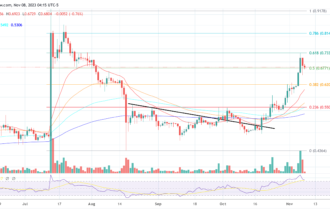The collapse of the FTX crypto exchange in late 2022 sent shockwaves throughout the crypto world. It was a wake-up call that sent regulators into panic mode, and the industry may well have to brace for draconian regulations.
But the self-inflicted implosion also shone the light on self-custody and cold wallets. Investors were left with massive losses and looking for ways to protect themselves from similar disasters in the future.
According to a report generated by Koinly, after the FTX collapse, investors are fleeing to cold storage, where they feel that their crypto is safe. This is why it’s essential to review cold wallets and their relevance in their nascent crypto industry.
What is a Cold Wallet?
A cold wallet is a cryptocurrency storage device that keeps your private keys and other sensitive data safe from hackers and malicious actors. It does so by spending most of its time disconnected from the internet.
Unlike hot wallets connected to the internet, cold wallets are entirely offline—making them much more secure. Cold wallets come in many forms, including hardware wallets and paper wallets.
The Benefits of Cold Wallets
Cold wallets offer several advantages over hot wallets. The most obvious benefit is the enhanced security they provide. Because they are offline, cold wallets are far less susceptible to hacks and other cyber-attacks.
Cold wallets also provide users with better control over their funds. Since the private keys are stored offline, users have full control over who can access their funds—allowing them to protect their investments from intruders and malicious actors.
Top 5 Cold Wallets
Are you looking for the best crypto wallets to secure your digital assets? Search no more. Here is a list of the top 5 cold wallets to go for.
- Ledger Nano S: The Ledger Nano S is a very secure wallet in that you can store more than 1,100 cryptocurrencies. It features a small screen and two physical buttons instead of a touch screen, as has become the norm with modern mobile devices.
- Trezor Model T: The Trezor Model T is a hardware wallet that has a touchscreen as its main feature. The hardware is light and can be easily carried around. It supports over 1,000 cryptocurrencies, including the major players: Bitcoin, Ethereum, Ripple, etc.
- KeepKey: KeepKey spots one of the largest displays in the hardware wallet market. You can use it to store many cryptocurrencies, with Bitcoin and Ethereum included.
- Paper Wallets: Paper wallets can be printed and stored offline. They give users total control over their funds since the private key is printed directly on the paper.
- Ellipal wallet: Ellipal is a solid hardware wallet for beginners and pros. It is air-gapped as it uses QR for communication with other devices.
Claiming Losses on Tax Returns
The collapse of the FTX crypto exchange left many investors with significant losses. Fortunately, these losses can be claimed on your tax returns. To do so, you will need to calculate your capital gains and losses for the year. This can be done manually, but a crypto tax calculator such as Koinly can make the process much simpler.
A crypto tax calculator is a software program that can help you calculate your crypto gains and losses for the year. It will automatically pull in the necessary data from your crypto exchanges and wallets, allowing you to quickly and easily calculate your capital gains and losses. This can save you a lot of time and hassle when filing your taxes.
Conclusion
The collapse of the FTX crypto exchange was a sobering reminder of the risks associated with investing in cryptocurrencies. To protect themselves from similar disasters in the future, many investors have turned to cold wallets.
Cold wallets are secure storage devices that keep your private keys and other sensitive data offline—making them far less susceptible to hacks and other cyber-attacks.
The top five cold wallets are the Ledger Nano S, Trezor Model T, KeepKey, paper wallets, and Ellipafte. Finally, investors who suffered losses from the FTX collapse can claim them on their tax returns by using a crypto tax calculator.











